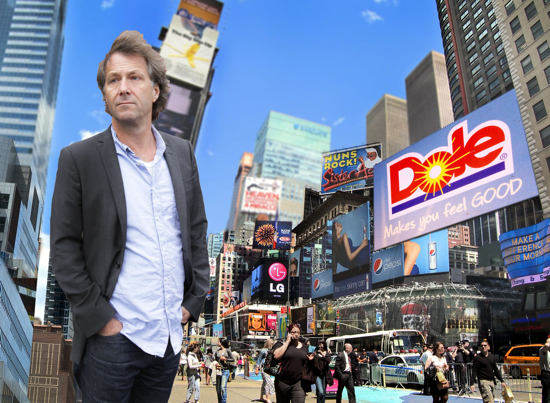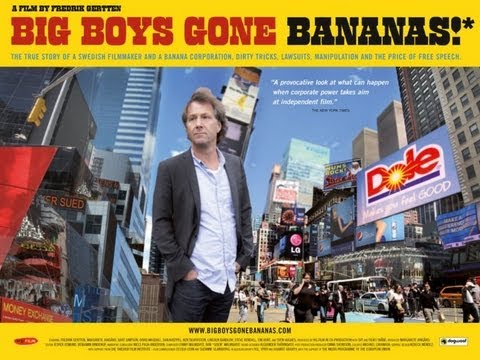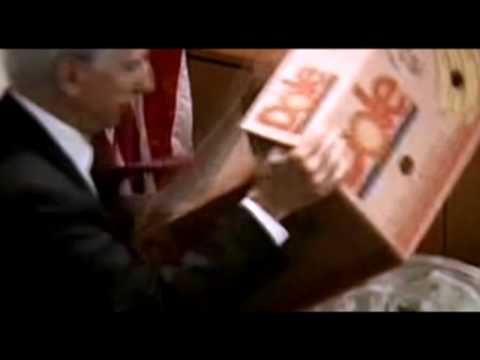Some of this century’s best documentaries so far have been those that shine a light onto our wonderful and frightening world. We only have to look at renowned German maverick Werner Herzog to encounter a series of perilous journeys into the nature of humanity. Herzog’s embrace of the format throughout his career has shown how visually artistic a good documentary can be. Other notable recent efforts such as Zidane: A 21st Century Portrait and The Story of the Weeping Camel achieve profoundness by representing reality alongside imagination; the camera does not lie, but the post-production may tell fibs.
However, there is another trend in factual features which slips in and out of the form’s artistic capabilities, sacrificing creative endeavour for a straight-faced declaration of facts. This exposé style is rife, particularly at a time when investigative journalism is suffering. Enter Big Boys Gone Bananas!*: a film about a film, an exposé about an exposé, charting Swedish director Fredrik Gertten’s David vs Goliath struggle against global giants Dole Food Company.
Back in 2009 Gertten directed Bananas!*, which followed a dozen Nicaraguan banana plantation workers on their path to justice, fighting Dole’s continued use of hazardous pesticides. Just days after launching a website and receiving acceptance into the Los Angeles Film Festival, the movie’s producers (WG Film) received a cease and desist order from Dole. When the film was finally aired, stripped of advertising and tucked away in a smaller screening room, the festival produced an accompanying letter of disavowal. Anxious about their reputation they sided with Dole’s story, claiming that, "Serious questions have been raised about [the doc’s] credibility."
From here, Gertten faced a protracted and arduous lawsuit against his documentary. Unlike Fellini’s movie-about-a-movie 8½, where the protagonist attempts to escape his directorial duties, Gertten was not looking for a way out, but a way in. "Their goal is to stop the film," he says. "Our goal is to screen it and release it."
Big Boys Gone Bananas!* is therefore about his quest to get the first documentary back from the dead and into the cinemas. It is an absorbing tale of corporate bullying, replete with insights into an increasingly bleak geopolitical horizon. It pulls back the curtain on a world where big business reigns supreme.
In this respect Big Boys… shows us freedom of speech under threat. Gertten says, "I always took free speech for granted. But as I came to learn, it depends on the story you want to tell." Over a stylised faux-shoddy VCR set-up, the opening minutes tell a tale of the film under wraps, hushed away underneath the legal battles. I asked its director about the torments of the lawsuit.
You went through a lot for this film, didn’t you?
Fredrik Gertten: It was not fun. There were some people who were coming up to us in the midst of it saying: "Oh congratulations! [It’s] so cool you’re getting sued." I tried to tell people: "Okay, I don’t think my mum thinks so, or my kids!" It’s not a PR stunt to get sued. You don’t do it for fun. We didn’t attack them. They attacked us. It wasn’t fun.
When you received the initial package (the cease and desist order from Dole) did you immediately think to get your camera out? At what point did it occur to you that a film was materialising?
FG: The package was actually the real package we opened. We received an email over the weekend with almost the same contents so I knew it was the papers coming. We just decided to shoot it. That’s what filmmakers do! That doesn’t mean that you have a film, you know, it’s something different. The material we shot in LA was published on the website. But [Dole] were so successful at controlling the media so we needed to tell our own stories and we used our web page for that. We also put up material in their favour because we wanted to be totally transparent. If journalists came to us they could get both versions. If they went to Dole’s side they couldn’t get anything.
I didn’t know if I had a film. We didn’t know what the film should be about. There were many options. I understood that the most interesting part was the media part – that I had to fight so hard with the journalists in Los Angeles. I was pushed into a very defensive position. With every interview I had to explain everything. The angle Dole had created was well done and it stuck; it pushed me into a corner of being a naïve, stupid filmmaker who made a crook [lawyer Juan Dominguez] into a hero.
My film is much more than a hit piece on Dole. It’s a story about what happens to whistleblowers and people who tell important stories where the powerful don’t like it. Hopefully other people can learn from the techniques that Dole applied against us. It’s the same techniques that are used against anybody who tries to tell a story. You can see right now with WikiLeaks and Assange. It’s very interesting. Everything gets very blurry and mixed up. It’s scary.
When watching the film it is clear that Dole were operating a very calculated campaign. How did you respond to the pursuit when it seemed like they were planning ahead, way in advance?
FG: It was very hard. I mean, we tried for a long time to tell journalists: "Come on, you don’t have to care about us, don’t write a single line about us – why don’t you just tell the story of the banana workers? There is a great news story in there!" We tried to point people in that direction but nobody went there.
We managed to turn it around in Sweden by being this small Swede against a big American. We suddenly had a different angle that was as good as their angle. But both of the angles left the banana workers out. Nobody went for the real story, and that was what Dole wanted. Dole had nothing personal with me, but they did with the banana workers. They managed to get people to talk about something completely irrelevant. My hope was for people to watch the film.
This recurs a lot in the film itself – many of the people involved had not even seen your film.
FG: Because it’s easier if you don’t watch it. If you don’t watch it you can keep your position. We invited these people to the screening though.
And at that screening you were pushed to the peripheries of the film festival. How did you feel to be completely shunned by the festival community?
FG: It was extremely intense. But I trusted my film [Bananas!*] to do the job. Now people were actually going to see the film I trusted that they would watch it and go: "Ah, so there is nothing to sue here!" I didn’t really care about the festival’s disclaimer. It was over-the-top and stupid. The audience were on my side. Before the screening of the film, after my speech, I showed the audience a Google tagging of my name. I showed our webpage, the [sponsored] Dole link, and I showed the audience a counter-trailer that Dole had made.
I believed that there was nothing to sue and I never doubted my film. Juan Dominguez was portrayed as a Ferrari-driving guy who wanted to go down in history. I never sold him as a hero. I had no worries about that.
How did you decide on this film’s title?
FG: It’s a little bit about a Pippy Longstocking moral: if you’re really big and powerful then you have to be very kind. Dole is the biggest food company in the world. If you’re that strong you have to be good. That may be naïve but that’s how I see the world. They are the big boys and they went wrong. They went bananas. Both of the films are stylistically different but they are both linked.
How did you feel being the central presence?
FG: I’ve never done a film with my own face in it before! I’m no Michael Moore or Morgan Spurlock. That’s not how I’ve done film over the years. But this story was hard to tell without me in the film, so I just had to accept it.
It is apparent that there is more to this film than the story itself. What do you believe your film says about freedom of speech?
FG: First of all, if we have free speech in our constitutions we need to defend it. And independent media has a crucial role. But we all know that traditional media is now losing money. Journalists are losing their self-confidence and every journalist has less time to work on stories. There is something going on out there that is very, very dangerous for democracy. We all have to think about how we can address that. It’s a political issue and we should ask for some sort of legislation around the PR industry. We the people, ha ha, need to know! Transparency is important in society.
Big Boys Gone Bananas!* opens in selected UK cinemas today; for a full list of screenings check the Dogwoof website.




